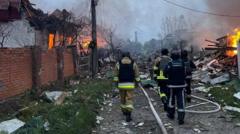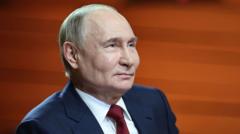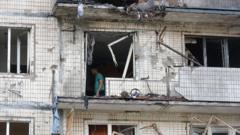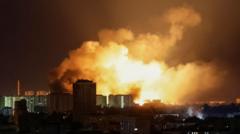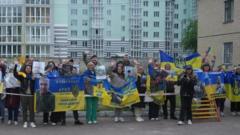The prospect of Ukraine holding elections amid its ongoing war with Russia has ignited debate, with officials discussing legal implications and voter logistics while the public remains wary.**
Could Ukraine's Elections Be on the Horizon Amidst Ongoing Conflict?**
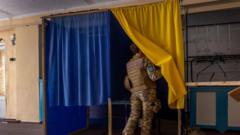
Could Ukraine's Elections Be on the Horizon Amidst Ongoing Conflict?**
As ceasefire talks advance, speculation grows regarding the potential for elections in Ukraine despite the war's upheaval.**
Would Ukraine even consider elections with the backdrop of Russia's ongoing invasion? The notion feels almost surreal as cities throughout the country experience nightly bombardment. Yet, conversations around the possibility of elections are re-emerging in the capital, Kyiv.
Historically, the mention of elections has sparked public discourse over the three years of the full-scale war, with officials and citizens alike insisting that unity against the Russian onslaught is paramount. Following the military's extensive presence, a presidential election slated for 2024 was postponed under martial law enforced as a result of the invasion.
Notably, the Kremlin continues to assert that President Volodymyr Zelensky's leadership lacks legitimacy, demanding a fresh election as part of any ceasefire negotiations, a stance echoed by some Western leaders. Nevertheless, recent talks hint that there may be evolving conditions warranting electoral proceedings by year's end, as Russian forces engage in tense ceasefire discussions.
Within the political landscape, speculation has emerged regarding potential rival Valerii Zaluzhnyi, former army chief turned ambassador in London, who publicly refuted claims about his political ambitions and stressed the necessity of focusing on wartime unity rather than electioneering. His remarks highlight the tensions surrounding the debate over prioritizing national stability.
Amidst this, Oleh Didenko, head of Ukraine's Central Election Commission, clarified that electoral law would need amending to proceed, especially concerning the necessary timeframe post-martial law. While some reports suggested a meeting had occurred to strategize around elections, others in government dismissed these as misinformation, emphasizing a strong focus on peace negotiations over political posturing.
Despite widespread public denial regarding imminent elections, there are signs of changing tides. Polling data reveal that Zelensky's public support has gained traction, suggesting a ripe moment for securing a second term. Some political analysts argue that a successful bid would bolster Zelensky’s position at the negotiating table.
Key dates loom on the political calendar, such as the parliamentary vote to extend martial law, which could be leveraged by Zelensky to propose elections once conditions shift. U.S. officials also seem persuaded that elections might unfold soon; however, challenges remain, especially concerning the potential of widespread voting via the Diia app, highlighted by recent successful uses for other civic duties.
Yet, critics caution against the viability of such a plan. Proponents of the app postulate that it could facilitate voting for displaced citizens and those at the frontlines. Still, concerns over cybersecurity risks, public trust, and logistical hurdles complicate matters further, alongside the public sentiment that suggests reluctance for elections even after resolving the ongoing conflict.
For now, a dichotomy exists between aspirations for face-to-face democracy and the harsh realities of war. As the country navigates this tumultuous period, the question remains whether Ukraine will prioritize unity over political ambition in the uncertain days ahead.



